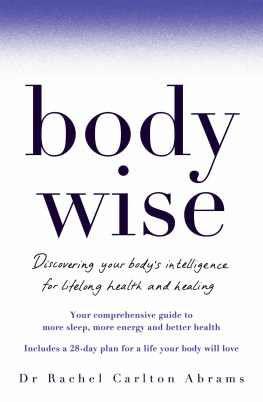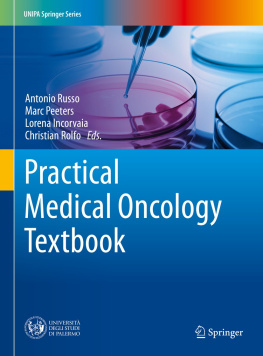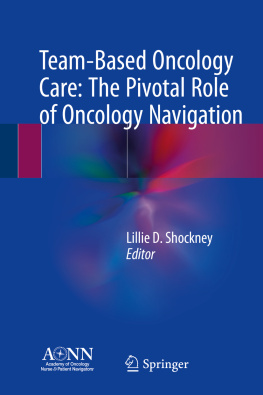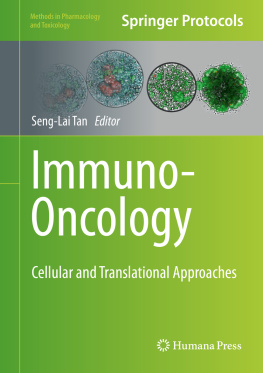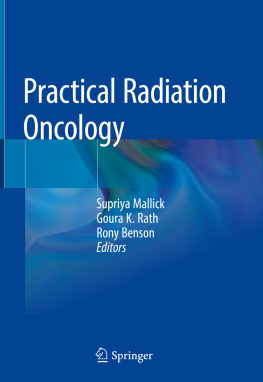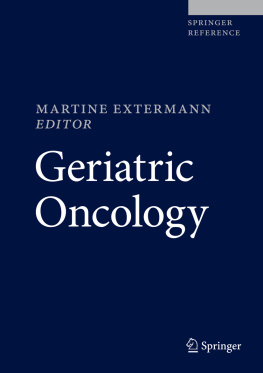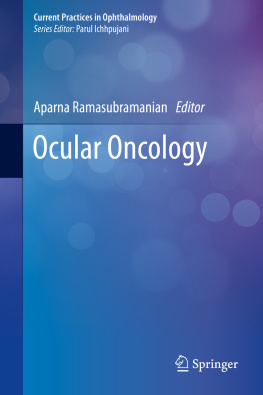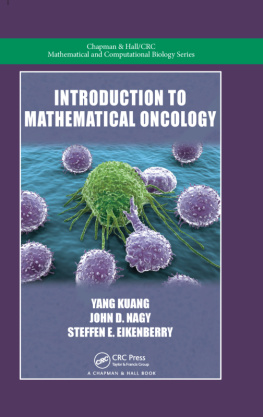Abrams Donald - Integrative Oncology
Here you can read online Abrams Donald - Integrative Oncology full text of the book (entire story) in english for free. Download pdf and epub, get meaning, cover and reviews about this ebook. year: 2009, publisher: Oxford University Press, Incorporated, genre: Romance novel. Description of the work, (preface) as well as reviews are available. Best literature library LitArk.com created for fans of good reading and offers a wide selection of genres:
Romance novel
Science fiction
Adventure
Detective
Science
History
Home and family
Prose
Art
Politics
Computer
Non-fiction
Religion
Business
Children
Humor
Choose a favorite category and find really read worthwhile books. Enjoy immersion in the world of imagination, feel the emotions of the characters or learn something new for yourself, make an fascinating discovery.

- Book:Integrative Oncology
- Author:
- Publisher:Oxford University Press, Incorporated
- Genre:
- Year:2009
- Rating:5 / 5
- Favourites:Add to favourites
- Your mark:
- 100
- 1
- 2
- 3
- 4
- 5
Integrative Oncology: summary, description and annotation
We offer to read an annotation, description, summary or preface (depends on what the author of the book "Integrative Oncology" wrote himself). If you haven't found the necessary information about the book — write in the comments, we will try to find it.
Integrative Oncology — read online for free the complete book (whole text) full work
Below is the text of the book, divided by pages. System saving the place of the last page read, allows you to conveniently read the book "Integrative Oncology" online for free, without having to search again every time where you left off. Put a bookmark, and you can go to the page where you finished reading at any time.
Font size:
Interval:
Bookmark:
Integrative Oncology
Weil Integrative Medicine Library
Published and Forthcoming Volumes
SERIES EDITOR
ANDREW T. WEIL, MD
Donald I. Abrams and Andrew T. Weil: Integrative Oncology
Karen Olness and Timothy Culbert: Integrative Pediatrics
Gerard Mullin: Integrative Gastroenterology
Victoria Maizes and Tieraona Low Dog: Integrative Womens Health
Randy Horwitz and Daniel Muller: Integrative Rheumatology, Allergy, and Immunology
Bernard Beitman and Daniel A. Monti: Integrative Psychiatry
Stephen DeVries and James Dalen: Integrative Cardiology
EDITED BY
Donald I. Abrams, MD
Chief, Hematology-Oncology
San Francisco General Hospital
Osher Foundation Endowed Director of Clinical Programs
UCSF Osher Center for Integrative Medicine
Professor of Clinical Medicine
University of California San Francisco
San Francisco, California
Andrew T. Weil, MD
Director, Arizona Center for Integrative Medicine
Lovell-Jones Professor of Integrative Rheumatology
Clinical Professor of Medicine
Professor of Public Health
University of Arizona
Tucson, Arizona


Oxford University Press, Inc., publishes works that further
Oxford Universitys objective of excellence
in research, scholarship, and education.
Oxford New York
Auckland Cape Town Dar es Salaam Hong Kong Karachi
Kuala Lumpur Madrid Melbourne Mexico City Nairobi
New Delhi Shanghai Taipei Toronto
With offices in
Argentina Austria Brazil Chile Czech Republic France Greece
Guatemala Hungary Italy Japan Poland Portugal Singapore
South Korea Switzerland Thailand Turkey Ukraine Vietnam
Copyright 2009 by Oxford University Press, Inc.
Published by Oxford University Press, Inc.
198 Madison Avenue, New York, New York 10016
www.oup.com
Oxford is a registered trademark of Oxford University Press
All rights reserved. No part of this publication may be reproduced,
stored in a retrieval system, or transmitted, in any form or by any means,
electronic, mechanical, photocopying, recording, or otherwise,
without the prior permission of Oxford University Press.
Library of Congress Cataloging-in-Publication Data
Integrative oncology / edited by Donald I. Abrams, Andrew Weil.
p. ; cm.
Includes bibliographical references.
ISBN 978-0-19-530944-7
1. Oncology. 2. CancerAlternative treatment. 3. CancerAdjuvant treatment. 4. Integrative medicine.
[DNLM: 1. Neoplasmstherapy. 2. Complementary Therapies.
QZ 266 I5687 2008] I. Abrams, Donald I. II. Weil, Andrew.
RC254.5.I52 2008
616.99406dc22 2008016137
1 3 5 7 9 8 6 4 2
Printed in the United States of America
on acid-free paper
To Clint for his nurturing, guidance, and inspiration
and
In memory of Sam for his friendship, wisdom, and good cheer
ANDREW T. WEIL, MD
Integrative medicine (IM) is healing-oriented medicine that takes account of the whole person (body, mind, spirit), as well as all aspects of lifestyle. It emphasizes the therapeutic relationship and makes use of all appropriate therapies, both conventional and complementary. IM is not synonymous with alternative medicine or with CAM (complementary and alternative medicine). It neither rejects conventional medicine nor accepts alternative treatments uncritically.
Integrative medicine is a rapidly growing movement in North America. Consumer demand for it has increased steadily over the past decades. Now, as the conventional health-care system collapses because of out-of-control escalation of costs of high-tech medicine, medical institutions are finally taking IM seriously. The Consortium of Academic Health Centers for Integrative Medicine has 41 members; among them are many leading medical schools, whose deans and chancellors recognize the need to move medical education, research, and practice in this direction. A major reason for the new acceptance of IM is awareness that it can lower health-care costs in two ways: (1) by shifting the focus of health care from disease management to health promotion through its attention to lifestyle and the innate healing potentials of the human organism; and (2) by bringing lower-cost treatments into the mainstream that can give outcomes as good as or better than those of pharmaceutical drugs and other conventional therapies.
Practitioners are also increasingly drawn to IM because they recognize its potential to restore core values of medicine that have eroded in the era of profit-driven health care. Yet demand for clinicians trained to practice IM greatly exceeds supply. The Arizona Center for Integrative Medicine that I founded in 1994 has graduated more than 300 physicians (and some nurse practitioners) from comprehensive fellowships, mostly in distributed learning formats. Many of them now direct IM programs at other institutions, some are training others, and some have authored leading textbooks in the field. The Center also trains medical students, pharmacists, and medical residents. One of its major goals is to develop a core curriculum in IM that will become a required, accredited part of all residency training in all medical specialties.
In the meantime, there is an immediate need to organize and make accessible to many more clinicians the basic principles of IM in practical application to common health conditions. It is hoped that the present series of volumes will help fulfill that need. Each volume will cover the relevance of IM to a particular specialty, and each will draw on the editorial expertise of a specialist who is fully trained in IM as well as the advice of senior experts who are open to, but not directly involved with, the IM movement. Each volume will also give detailed protocols for the management of conditions that respond well to integrative treatment and will discuss areas of controversy and uncertainty where further research is needed.
Some physicians may find this information of use in meeting the needs of patients better. Some may use it to determine the best treatments for common conditions. Others may simply want to know more about CAM therapies their patients are using, if only to be able to discuss them intelligently and give advice about possible interactions between, say, conventional drugs and dietary supplements or botanical remedies.
Promoters of IM have been criticized for advocating unscientific or even antiscientific theories and practices. The commitment of all editors involved in this project is to present the evidence base for integrative treatment strategies. Readers should note, however, that IM teaches practitioners to use a sliding scale of evidence in making therapeutic choices: the greater the potential of a treatment to cause harm, the stricter the standard of evidence it should be held to for efficacy. We may recommend therapies that do not yet have a solid evidence base for efficacy if their potential for harm is low. Examples are suggesting therapeutic massage for persons with advanced forms of cancer as a means of improving quality of life or teaching hypertensive patients breathing techniques to increase the tone of the parasympathetic nervous system. All authors have been charged with the task of citing the best available evidence for both safety and efficacy of therapies discussed.
Next pageFont size:
Interval:
Bookmark:
Similar books «Integrative Oncology»
Look at similar books to Integrative Oncology. We have selected literature similar in name and meaning in the hope of providing readers with more options to find new, interesting, not yet read works.
Discussion, reviews of the book Integrative Oncology and just readers' own opinions. Leave your comments, write what you think about the work, its meaning or the main characters. Specify what exactly you liked and what you didn't like, and why you think so.

